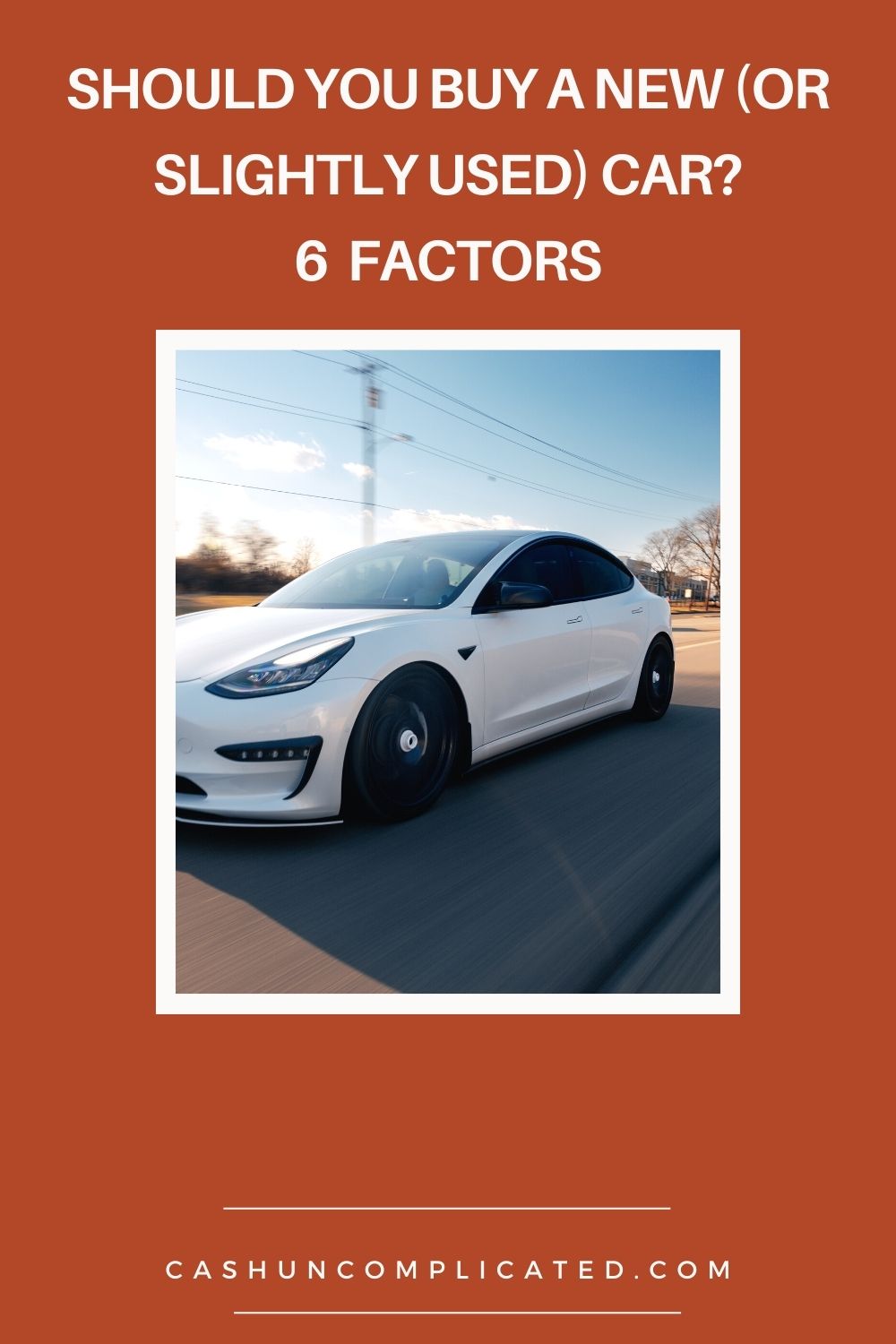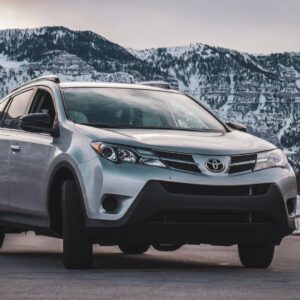Should I buy a new (or used) car or keep my old one? This is a question that comes up a lot in personal finance so I’m going to unpack this question in greater detail.
My Car History
Before we get into the weeds, I’ll give you my car history. Since I was 16, it’s pretty much been used cars that I’ve kept for a long time.
- High school: Used Nissan my parents let me borrow
- Late high school through post-college: Used Chevy I bought from my parents
- Most of my 20’s: New Honda I put a bunch of miles on because of a long commute (bought new because it was about the same price as used)
- Late 20’s through early 30’s: Used Audi
- Early 30’s through mid 40’s: Used Honda that lasted over 236,000 miles and was still going strong when I sold it
- Last month-First new car purchase in over 20 years (new was about the same price as used after tax incentives)
So safe to say I’ve been pretty conservative with cars, and I’ve kept almost all of them a long time, especially the Honda I just sold last month. I’m also proud to say I haven’t had a car loan since my early 30’s, which I believe is a big factor in being able to invest on a regular basis.
Why I Have a Strong Opinion on Cars
The goal of this blog and my book Cash Uncomplicated is to help people gain financial clarity and put themselves in a position to save, invest, and not have to worry about money day to day. Financial harmony is the goal.
My strong opinion about cars is that they have put a lot of people in a really bad financial spot. Too many people buy cars they can’t afford, get upside down on their loans, and take out way too much debt. This leads to stress, not being able to invest as much, and a whole array of not so good things.
Obviously cars aren’t the sole culprit for such negatives, but I think they play a big part, especially for those just starting out. It might sound old fashioned, but the person who purchases a reliable car at a price they can afford puts themself in a much better financial position than someone who doesn’t.
Should You Buy a New Car?
With all that said and out of the way, let’s move on to the question of whether you should buy a new car. By “new”, I mean either brand new or a used car that’s an upgrade over your current vehicle.
Number 1: Why Do You Want a New Car?
The first question is simple. Why do you want a new car?
- For the reliability?
- Better fuel efficiency?
- Comfort and drivability?
- To impress others?
- Something else entirely?
Really think about why you want a new car. Be honest with yourself and don’t try to sugarcoat your real answers.
If you want it to impress others, that’s your answer and a starting place to ask more questions. Albeit not the best reason to want a new car, but it’s your answer and where you’re coming from.
Perhaps you drive long distances in the early mornings and want something as reliable as possible so you’re not stuck in an area with few people around. Maybe your current car broke down in an isolated area and you’re willing to pay more so that doesn’t happen again.
So be honest with this first question and decipher your reasons for wanting a new car. These reasons will help you with the following questions as well.
Number 2: What is the Condition of Your Current Vehicle?
Are you driving a 20-year old nearly broken down car that barely gets you to and from work? Or is your car a few years old but doesn’t have all the amenities that a brand new car does?
If your primary motivation for wanting a new car is reliability and you already have a reliable car, you probably don’t need a new one. But if your reasons for wanting a new car are entirely different, keep asking more questions.
Number 3: What’s the Price Difference Between the New Car and Your Old One?
Part of any due diligence process is a cost analysis of the old versus new.
For this step, it’s important to factor in more than just initial cost of the vehicle. Look at projected maintenance costs, fuel efficiency, upcoming major repairs/maintenance, etc. A really good cost of ownership website is Edmunds.com.
Here’s an example of a price comparison using an older and brand new vehicle to illustrate there is more to it than just the sticker price.
Current Car: 2014 Sedan with 130,000 miles. Vehicle is paid off and in average condition. You’ve done most of the maintenance but have skimped here and there on some things.
The timing belt is due in 10,000 miles, the radiator needs to be replaced asap, and there are a few oil leaks that require you to top it off every couple weeks, and sometimes the car is slow to start. Car gets 25 miles per gallon and maintenance and repairs are about average for a car this age. Current KBB value is $5,700.
Prospective Vehicle: Used 2021 Sedan Hybrid with 37,000 miles, $24,500 including taxes and registration. Vehicle is in premium condition according to seller and your mechanic, who you had inspect the vehicle. No major repairs are scheduled, but the vehicle will need new tires in about 15,000 miles. Car gets 45-50 miles per gallon and has never had a major mechanical issue.
The Analysis
You’ve got your old car in the condition listed above and this newer (used) car in what seems to be excellent condition. Assuming you sell your old car for the current value, that leaves you with $18,800 that you need to come up with to purchase the newer car.
The newer car seems like it’s going to be considerably less expensive to operate, maintain and repair, but you’ll also have to pay $18,800 upfront. Looking at your old car, there are several large repairs and maintenance costs coming down the pipeline, probably in the neighborhood of a couple thousand dollars, plus much higher fuel costs.
And a greater likelihood that more issues will arise than with a newer car.
So the analysis is basically $18,800 more for a car that is very likely going to cost you less and be more reliable in the future. This isn’t a slam dunk either way, so it depends on your risk tolerance and what you’re willing to pay for more security and less likelihood of future problems.
However, if you’re someone with some mechanical skills, you’re probably going to want to go in the direction of keeping the older car since you can do most of the work yourself.
I personally would probably keep the older car for a few more years, put a few thousand dollars into repairs and maintenance, and pay more at the pump for a while. But I wouldn’t have a big argument with someone who went the other direction.
Number 4: Can You Afford It?
This question is simple, can you afford it? I personally prefer to pay for cars in cash. I know there’s arguments against that, but it’s what works for me. So affording it for me is whether I can pay cash or not.
If you’re like me and prefer to pay cash, you’ll have to determine if you can swing it. If you’ve got the cash, you can afford it. And if you don’t have the cash–you can’t afford it yet.
If you’re someone who prefers payments, you’ll have to determine if you can afford the down payment and monthly payments. That means a lump of cash in the beginning and monthly payments for probably between three and five plus years.
If you have the extra money for monthly payments, then you can afford it. If you don’t, you’ll have to either figure out a way to afford it or postpone the purchase until you can.
Again, my strong preference is to pay for cars in cash. It mitigates the risk of a job loss, unexpected expenses, and routine things that come up in life. Life without car payments has been much less stressful for me financially.
Number 5: Is This a Need or Want?
There’s a big difference between a need and a want. A want is desiring an upgrade for what could be a multitude of reasons–better performance, nicer interior, more stylish appearance, etc.
There is nothing wrong with buying a want, you just have to be able to afford it.
While a need is an absolute must. Such as a car being totaled, a repair exceeding the value of the vehicle, or a completely unreliable older vehicle with high mileage. A need is something you have to buy or have negative consequences.
Number 6: Are You Already on Track With Your Money Goals?
Someone on track with their money goals is in a much better position to buy a newer car than someone who isn’t. The problem with people buying newer cars isn’t necessarily the purchase of one, but people buying one who aren’t on track for their money goals.
Here’s an example. Tom and his brother Tim are two years apart, both in their thirties. Tom likes to spend most of what he makes while Tim has always been a saver and investor.
Tom lives paycheck to paycheck and has about $2,500 in savings. He doesn’t invest but says he wants to start “at some point.”
Tim has been investing since his early twenties, currently has over $750,000 invested, and has a large emergency fund. He estimates that he’s on track to financial independence by the time he reaches 50.
Tom is not in a great position to buy a newer car. He’s paycheck to paycheck and doesn’t have much cash in reserves. But Tim is. If he wants a newer car, he can easily afford it, even if it’s a want.
Conclusion
Buying a new or newer car is a decision that shouldn’t be taken lightly for most people. Cars cost a lot of money and maintenance and repair costs greatly vary. A bad car purchase can set the average person way back and come with years of payments and/or expensive repairs.
If you’re looking at buying a car right now, go through these questions and see how you answer them. Once you have some clarity, make a wise decision that works for you.
Are you considering a car purchase right now or in the next couple years?












